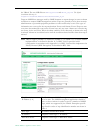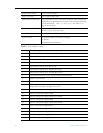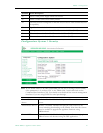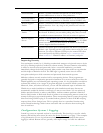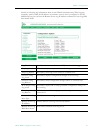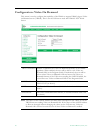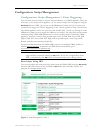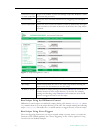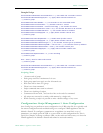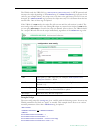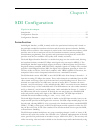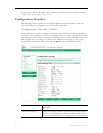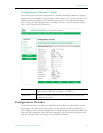
MPEG-2 Configuration
VBrick MPEG-2 Appliance Admin Guide 53
Sample Script
vbrickSlot2EncoderNetworkTransmitEnable = 2 // set enable slot 2 encoder transmit
vbrickSlot2EncoderNetworkApplySet = 2 // apply above encoder network set
* // end of a group
vbrickHDRecorderControlMode = 1 // set recorder to user controlled mode
vbrickHDRecorderControlIrEnable = 1 // disable recorder ir control
vbrickHDRecorderControlName = event1record.mpg // set recorder file name
vbrickHDRecorderControlDuration.value = 30 // set recorder duration to 30 seconds
vbrickHDRecorderControlBatchEnable = 1 // set recorder batch to disabled
vbrickHDRecorderControlApplySet = 2 // apply above recorder control sets
* // end of a group
vbrickHDRecorderControlFtpEnable = 1 // disable auto ftp after record
vbrickHDRecorderControlApplySet = 2 // apply above recorder control set
vbrickHDRecorderNetworkReceiveType = 1 // set recorder receive type to ip address
vbrickHDRecorderNetworkReceiveIpAddr = 239.22.129.3 // set recorder receive ip address
vbrickHDRecorderNetworkReceivePort = 4443 // set recorder receive port
vbrickHDRecorderNetworkApplySet = 2 // apply above recorder network sets
* // end of a group
vbrickHDRecorderOperationStart = 2 // start recording
* // end of a group
wait = 5000 // wait for 5000 milliseconds
* // end of a group
vbrickSlot1EncoderNetworkTransmitEnable = 2 // set enable slot 1 encoder transmit
vbrickSlot1EncoderNetworkApplySet = 2 // apply above encoder network set
* // end of a group
Scripting Notes
• * denotes end of group.
• Each group can have a maximum of six sets.
• Each group must have apply sets for all normal sets.
• Wait state will be alone in a group.
• There is no clear command.
• Script commands must start in column 1.
• There is no chaining of scripts.
• Comments will start with / and can be a line or the end of a command.
• All scripts are executed in a strictly serial manner by a single task.
• While executing a script it is possible to miss a double change of any event.
Configuration: Script Management > Auto Configuration
Auto Config lets you perform an auto-configuration via a URL script file. It is typically used
for remote configuration and troubleshooting or to configure VBrick appliances that are
behind a firewall. To configure a parameter on an appliance (or more likely a set of
parameters) you simply point the URL to a server with an .xml configuration file. This is
useful, for example, to change a reflector URL, set the audio and video rates, etc. when the
VBrick appliances are behind a firewall and cannot be accessed remotely.



